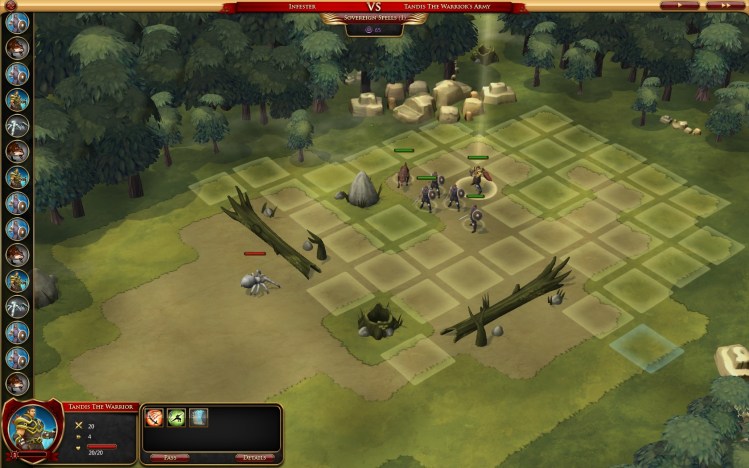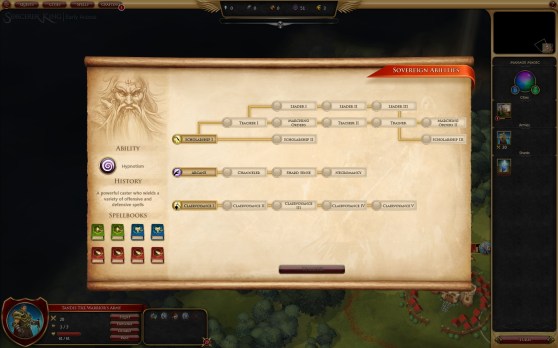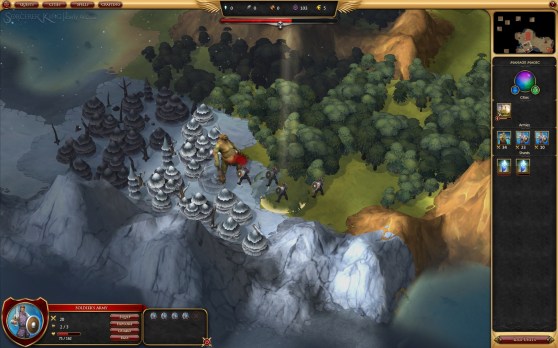Stardock’s new Sorcerer King fantasy strategy game may have a shot at repairing the company’s tarnished reputation.
The developer is best known for its well-reviewed Galactic Civilizations series of space 4X (“eXplore, eXpand, eXploit, and eXterminate”) strategy games. Its last foray into fantasy strategy was Elemental, the company’s first land-based series of games. Stardock created Elemental: War of Magic in 2010, a game critics pilloried for everything from its A.I. to its graphics.
The new game puts you in a world that has almost been all but destroyed by the Sorcerer King, a bad guy with no backstory who has holed up in his fortress and sent his minions of darkness out to destroy the last magical shards that protect the world. You’ll use strategy to protect the crystals, defeat his two powerful lieutenants for the keys to do battle with the King, and defeat the King himself.
Sorcerer King marks the first time the company has tried a new fantasy series since Elemental, and it’s built on a new platform. It’s available for PC in Early Access beta on Steam ($40, with a limited-time discount of $34) and is due for release in spring 2015.
June 5th: The AI Audit in NYC
Join us next week in NYC to engage with top executive leaders, delving into strategies for auditing AI models to ensure fairness, optimal performance, and ethical compliance across diverse organizations. Secure your attendance for this exclusive invite-only event.
You, in God mode
The game doesn’t stick too close to the 4X tradition of competing against computer-controlled campaigns with similar access to resources and power for control of the map. That makes for some interesting gameplay. I played through a full campaign, though not a successful one.
You start by choosing a Sovereign type — that’s essentially you, the player. For the preview, only the wizard was available, but warlord, guardian, priest, warrior, and tinkerer were grayed out on the selection screen. You can use actions to help your units or your cities (in the wizardly case, by casting spells) as a sort of omniscient presence overlooking it all.
You’ll be able to customize your Sovereign, but that’s also disabled at this point.
Then you choose your map. Four are available now, with more to come. Sliders control the size (tiny to huge, currently disabled), the magic available (gradual to normal to supreme), and the difficulty (beginner to normal to insane).
Start the game, and it’s already almost over
Once you’re in the game, the Doomsday Counter starts ticking. That’s a red bar at the top of the screen that measures the Sorcerer King’s progress at taking over what’s left of the world. You can set it back a bit as you progress, but it tends to march on, acting as a timer to keep you moving along.
“The game starts, and the war is already lost,” Stardock brand manager Adam Biessener said. “You’re using tools to solve different problems.”
The Sorcerer King makes the most progress on the counter when he destroys crystals, which are physical objects in the landscape. You’ll be moving your units and named heroes quickly to protect as many as possible, and if you build settlements near them, you can harness them to add to your resources. This introduces an interesting element of tower defense.
You’ll have three goals in Sorcerer King, at least until you battle the big guy: stay alive, protect the shards, and protect and inspire other survivors to join you. The minor faction system isn’t playable yet, but the concept is that your troops can do things to help convince other survivors to join up with you, adding to your forces and your chances to succeed.
Meanwhile, the Sorcerer King’s forces will attack you and your allies and build on all the good land. If the Doomsday Counter fills, the game is over even if you’re still alive.
Easy or complex? Pick your gameplay
You can make your game incredibly simple if you’re in the mood for a fast round. Train new units with your city, move them around, and click to fight things or loot things or explore. You can choose to customize nothing other than selecting new Sovereign spells or abilities for your named heroes and still succeed — for a while.
You can tab through units or click on the Turn button to move to the next thing you have to do. In a very beginner-friendly move, the game won’t actually show the word “turn” on that button until you’ve completed or passed on everything you can do in a round.
But if you decide to mess around, the game’s abundant tweaks will keep you entertained for a long while.
You can balance your magic generation between skills, which furthers your tech trees; mana, which enables you as Sovereign to cast spells; and lore, which enables you to learn new spells more quickly. This isn’t a slider — it’s a globe enabling you to slide around a point to tweak the exact balance you want between all three options.
Equip your units and send them into combat
You learn new recipes as you go and pick up crafting materials, which you can use to make armor, weapons, potions, and scrolls. These can give your units abilities or add to their stats. You choose which of your units gets what. Everyone, from the heroes to the lowly soldiers, has equipment slots.
“It lets the player decide how to customize your units in much more atomic ways,” Stardock president and chief executive Brad Wardell said.
As the wizard Sovereign, you can cast spells on each unit that will protect them or give them extra experience points to level up. It takes some mana to keep up those spells, so you can’t just cast them willy-nilly on your whole army. You may also cast spells on your cities to increase their productivity in different ways.
If you like, you can even name your units and cities.
Finally, you can auto-battle or choose to control your units on chessboard-like battlefields. Needless to say, if you micromanage properly, your odds of winning are better. But even autoplay feels satisfyingly reasonable.
Quests interrupt normal 4X gameplay
As in most strategy games, you can expand your city’s control over more area to get more resources, build buildings to advance your cause, and settle new areas to harness the power of more resources and more crystals. Those settlements can level up as well.
You’ll start with pioneers, scouts, and soldiers, but later you’ll obtain ranged units, mages, and healers. Some require buildings, and some depend on decisions you make.
In an interesting twist, choices will pop up as you interact with people and other races in the game world. These miniquests are often funny since they’re authored by a Cracked.com writer, and they’ll be the driving factors for convincing the minor factions to help you (when those factions enter the game).
Depending on the options you choose, you’ll receive different rewards.
It’s far too early to decide whether Sorcerer King will end the bad taste left by Elemental, but the game has potential. Even in this extremely limited beta, the title demonstrates a satisfying depth to gameplay with the promise of more to come. You can watch developers play every Wednesday afternoon if you’d like a better feel.
Balancing still feels wonky, and too many enemies may attack a bit too early. But that’s in the nature of this adventure, which puts you in a race against the Doomsday clock and Stardock in the race to clear its name.








